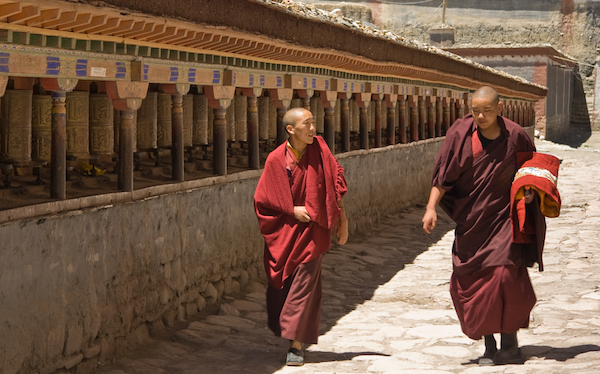“Don’t spend too much time trying to wipe the mind clean in order to achieve a state of nothingness. Acknowledge and embrace the sounds and sensations in your environment. We’re all interconnected and these things are part of the environment in which we live.”
This piece of advice, given to me by a Tibetan Buddhist Monk in India was probably the most valuable advice I’ve ever been given, and it came at the perfect time.
Why I came to India is a long story, but it came about following the brutal murder of my partner 10 years ago. This devastating loss brought the realisation of life’s fragility and the importance of living in the moment.
As humans, we all experience situations of uncertainty, grief and stress, but very few people realise that the impact of these situations is heightened through our own perceptions of the world, and therefore we have the power to minimise it simply by changing our mindset.
Meditation is an excellent tool for doing this, but in my personal experience it’s often taken far too seriously. Please don’t misunderstand me, I’m not saying it isn’t a serious issue, but people get so stressed out about meditation and the misconceptions surrounding it. This often leads to feelings of failure and a reluctance to try again. Many find their own coping strategies such as drugs, alcohol or prescribed medicines but for me, I decided to embark on a journey of self-discovery.
My first experiences of meditation were around 20 years ago, way before India and I thought I’d had it all figured out. Looking back though, I also found this “clearing the mind stuff” a problem and probably didn’t benefit much at all from it.
If you’re experiencing similar problems, please don’t worry because I think I can help.
One of the most misunderstood facts about meditation is that it’s about clearing the mind completely of all thoughts so it resembles a blank canvass, when in actual fact, nothing is further from the truth. In today’s Western economic climate, many lives are impacted by targets and deadlines which subsequently brings stress, so the brain needs to find a way of managing it all. This may be a major factor in why Westerners find relaxation more difficult than their Eastern counterparts.
My chance meeting with the Tibetan Buddhist Monk happened not long after my arrival in Dharamsala in northern India, which is, of course, also home to His Holiness the Dalai Lama. In such a spiritual place, you’d expect meditation to flow as freely as the Himalayan streams, but it wasn’t the case at all.
Every morning at 5 a.m. I’d go onto the guesthouse roof for my morning meditation, hoping to clean my mind, and each time I was met with a complete block.
Then five days into my stay, another monk having witnessed my frustration suggested I seek advice on a higher level. This is how I met the most wonderful teacher, and how I came to study Tibetan Buddhism at the monastery of His Holiness the Dalai Lama, and more importantly how I gained the insight that I’m now able to share with you.
If you’re struggling to find that perfect state that everyone talks about, you’re really not alone. There are however a couple of things to consider. For example: Are you trying too hard and are you complicating the issue?
When you try to relax into meditation, it’s perfectly normal for thoughts and noises to distract you. This is because your brain is trying to do something it isn’t used to doing.
It’s important to embrace and acknowledge whatever comes into your mind and then let it pass like the waves on the sea. In reality we’re all interconnected and therefore the sounds, smells and sensations in our environment shouldn’t be seen as obstructions to meditation, but a constructive part of it.
When the penny finally dropped with me, and after practicing this way for some time it became clear where I’d been going wrong all those years and my mind became lighter and much sharper.
Embracing and acknowledging what might otherwise be seen as distractions, helped me to connect with the universe as a whole and I am absolutely certain it can help you too.
Relephant Favorite:
How to Meditate: The Dathun Letter, via Chögyam Trungpa Rinpoche.
~
Author: Julie Kelly
Editor: Toby Israel
Photo: Wikipedia







Read 3 comments and reply